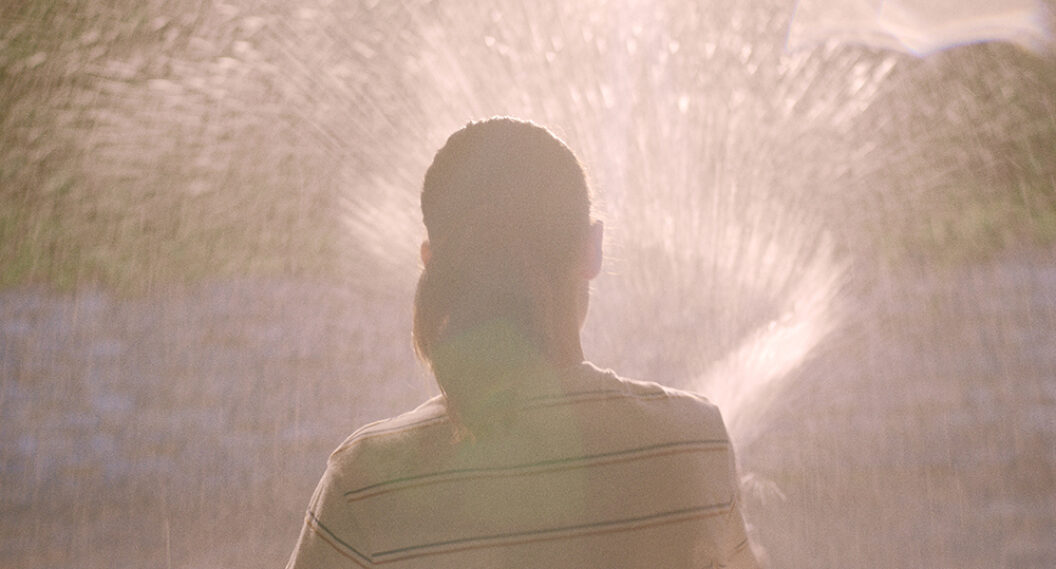
Jacqueline Lentzou, still from Moon, 66 Questions, 2021, video, 108 minutes. Courtesy of Film Movement.
Editor: Smaro Papaevangelou
Writer-director Jacqueline Lentzou for Moon, 66 Questions | “The film’s editor, Smaro Papaevangelou, was pure gold.”
Jacqueline Lentzou by Savina Petkova: The Greek writer-director discusses her elliptical drama, Moon, 66 Questions, a study on the inner turmoil of a young woman returning home to care for her ailing father.
“Hypnotic” is a fitting word to describe Jacqueline Lentzou’s debut feature, Moon, 66 Questions (2021), not only because of its mesmeric visual style which shimmers on the film’s multiple surfaces—home video snippets, intuitive close-ups, interspersed tarot cards—but also because the Ancient Greek god Hypnos was a son of the Night and a brother of Death. Liminal spaces are essential to Lentzou’s work as meeting points for encounters in preparation. Similarly, in Moon, 66 Questions when a young woman, Artemis (Sofia Kokkali), comes home to take care of her ailing father, Paris (Lazaros Georgakopoulos), their estrangement transpires from the very first scene they share. As the film unfolds, Artemis carves out a possibility for the two of them—once eons apart—to finally meet in a metaphysical space conjured up from her diary entries, read as voiceovers to old videotapes shot by Paris before he was ill.
Lentzou is interested in points of contact, and it’s no wonder our conversation ends up being a kind of collage, touching on themes, ideas, and intuitions behind her feature film, and hinting at the way she has worked on her award-winning shorts. Moon, 66 Questions attempts to map out its protagonist, her heart, and history, without offering either a manual or a transcript. Without resorting to the seductive ease of psychologization, the story develops a stream of consciousness of its own, one that is highly empathic and ready to invite love in.
—Savina Petkova
[...]
Savina Petkova
Speaking of the look of the other, let’s talk about the VHS footage in the film. They are effectively Paris’s point of view from a past long gone. But with the voiceover of Artemis, and her diary being narrated (from the present? or the past?), there is an alignment of gazes, somehow. How did you build these interludes to avoid being explanatory but also have them as an integral part of the father-daughter tension?
Jacqueline Lentzou
I wanted to find a way to connect them before they are seen connecting in the film. A foreshadowing of love.
So, indeed the VHS breaks were present in the script, yet they were perfected in editing. There was a lot of rewriting and subtracting, which was key in not becoming explanatory or melodramatic at points. It was a big test for me: how to treat Artemis’s sole way of speaking to us.
The film’s editor, Smaro Papaevangelou, was pure gold.
Jacqueline Lentzou, still from Moon, 66 Questions, 2021, video, 108 minutes. Courtesy of Film Movement.
SP
On that note, what’s your approach to editing and your process—the rationale or intuition of it? The way Moon, 66 Questions unfolds, it keeps posing questions through the way sequences bounce off each other, contradict or complement each other.
JL
Editing took a long time. Along with Papaevangelou, we incorporated several tools: we worked structurally, we worked based on meaning, we worked intuitively. The material was a lot; therefore the possible options were equally many.
Yet, the bipolarity of some scenes, what you may call “contradiction,” is core to the project and to the film’s premise. It did not happen in the edit; I wanted it to be there. It all stems from a Greek word whose synonym I have not yet found, τραγέλαφος: tragedy and a comedy at once.
[...]
Savina Petkova (2023) Jacqueline Lentzou by Savina Petkova. BOMB